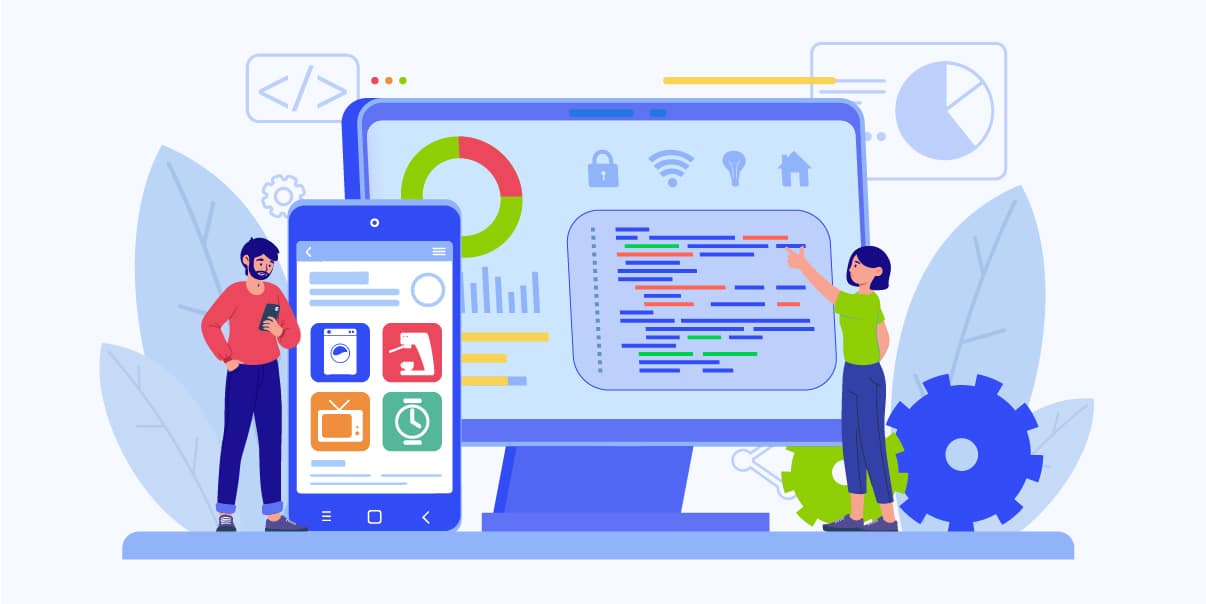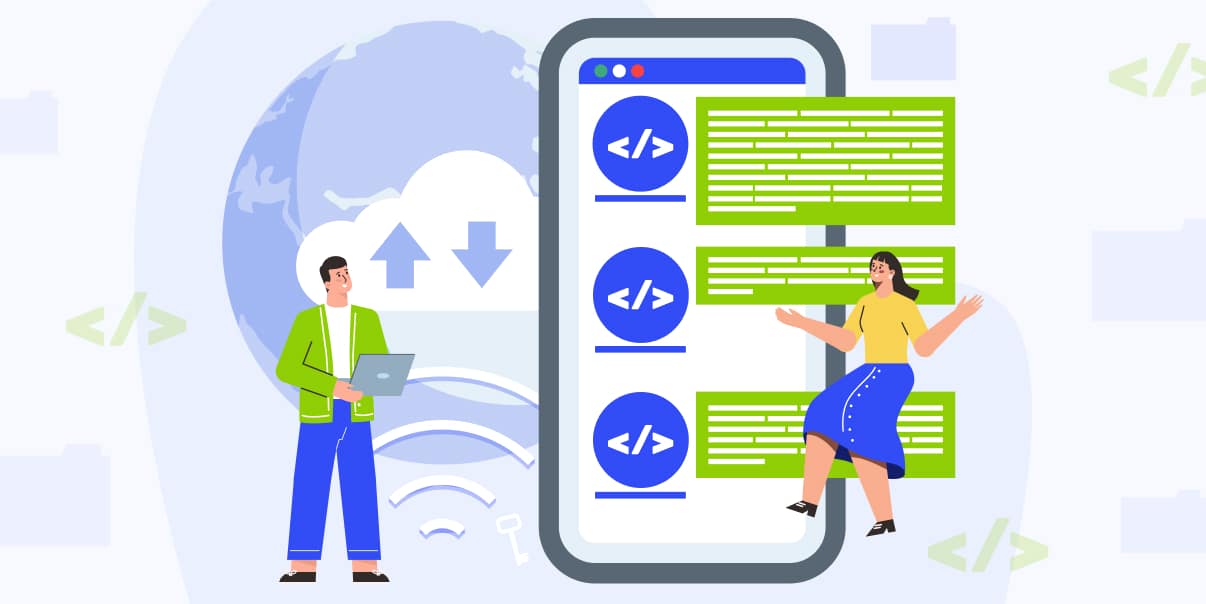The Best Mobile App Development Trends to Watch Out for in 2023

It’s no surprise that mobile app development is one of the most fast-changing tech areas. Mobile app development trends are continuously evolving with the increase in app usage.
The new year ushered in several trends mobile app developers should be aware of to stay ahead of the game. Many new things are happening in the mobile app development world. This article covers some of the best trends to watch out for in 2023.
What Is Mobile App Development?
Mobile app development is the process of software app creation for mobile devices. It involves designing, coding, and testing apps. These steps ensure apps function well across different mobile platforms. Mobile app development requires knowledge of the following:
- Coding languages
- Databases
- Frameworks
- Software tools
Also, it consists of building intuitive interfaces across various devices. Mobile app development is growing, with new trends emerging every year. Companies must stay up-to-date on these changes to create engaging and successful apps.
Top Mobile App Development Trends for 2023
![Top Mobile App Development Trends for 2023 [Infographics]](https://www.bitstudios.com/wp-content/uploads/2023/05/Mobile-App-Development-Trends.jpeg)
Get ready for the future of mobile app development! In 2023, expect various exciting trends shaping how developers create and use apps.
Here are the top mobile app development trends you should watch out for:
5G Technology
5G technology has revolutionized the way people use the Internet. It speeds up downloads up to 20 times faster than the 4G network. Also, it makes more advanced mobile app development possible. Moreover, it enables a more seamless and immersive experience with mobile apps.
5G makes creating cloud-based apps accessed by many devices easier. It enables more efficient communication and smoother streaming between different digital devices. With 5G technology, businesses can produce faster, more secure apps and provide a better user experience. It creates more opportunities to innovate in the field of mobile app development.
Artificial Intelligence and Machine Learning
Artificial Intelligence (AI) and Machine Learning (ML) are revolutionizing people’s lives. AI is an advanced form of computing that mimics human intelligence. In contrast, ML is a subset of AI that uses algorithms to learn from data.
You can use both technologies in many industries as they enable you to do more things faster. Also, you can apply these tools in healthcare, manufacturing, and many other industries. AI and ML help people understand complex problems in exciting new ways.
Virtual Reality and Augmented Reality
Virtual Reality (VR) and Augmented Reality (AR) are vital parts of today’s modern world. VR is a computer-generated environment where you can easily interact and explore. It creates an immersive artificial environment for the user, allowing the senses of sight, hearing, smell, and touch to engage in this new space.
Meanwhile, AR adds layers or digital objects to our view of the actual world. It creates an interactive experience in various areas, from gaming to travel to healthcare. For instance, you can use it for events, business, or navigation apps. Its potential is massive in the development of mobile applications.
With these technologies, mobile app developers can create immersive and interactive experiences. As the possibilities expand, more businesses use VR and AR to work faster, better, and wiser.
Internet of Things App Integration
The Internet of Things (IoT) is opening up exciting avenues for application integration. Users can control and customize their home, office, or other areas with the press of a button or the swipe of a finger. Automated systems are becoming more common in today’s market. They allow users to increase efficiency and convenience in their daily lives. IoT in mobile apps gives you access to real-time data by integrating apps with different devices. It also provides an ideal solution to connect people and things through app integrations.
Using this emerging technology, you can create apps with better user experience. Also, it makes mobile app development more efficient and cost-effective, as you don’t need to create separate apps for each device. You can leverage the recent trends with IoT app integration to create dynamic experiences.
Apps for Foldable Devices
Apps for foldable devices are becoming one of the most popular trends in technology. They offer smartphone users a great way to experience gaming or streaming media with larger screen sizes and portability. Web developers take advantage of the larger screen size and other features available on these foldable devices.
Moreover, designers create apps to make it easier to access content while maintaining an aesthetic look and feel. These apps have built-in features that allow users to do many things simultaneously. Foldable devices get better each day as developers release innovative apps. As a result, these deliver a unique and enjoyable user experience.
Beacon Technology
Beacon technology is revolutionizing the way businesses interact with their customers. Using Bluetooth low-energy beacons, companies can track customer movement and engagement. These beacons provide unique insights into customer behavior and preferences. Plus, customers get targeted ads and notifications while in the store. More than creating a better customer shopping experience, beacon technology also builds loyalty.
Beacons allow for the independent functioning of appliances and device tracking capabilities. They let users have unparalleled control over their gadgets and connected home devices. Moreover, beacon technology empowers businesses to bring a more practical service delivery. It enhances customer experiences thanks to its near-instant ability to process user data inputs. Finally, developers find new ways to better use beacon technologies’ extensive functionality. Also, they try to improve retail processes or revolutionize safety alerts.
Wearable App Integration
Wearable app integration has revolutionized how people stay connected and interact with technology. It allows you to connect seamlessly with your mobile phones, watches, and other high-tech devices. Also, it lets you access notifications, messages, and other apps as if they were on your wrists. It’s a convenient feature that makes multitasking easier. With its many features, wearable app integration is now an essential part of modern life.
Wearable technology is one of the most valuable inventions to date. It’s sleek, stylish, and resourceful and lets individuals access information with a few clicks. App integration offers unprecedented ways to operate a wearable device more simply. You need to attach your device, log in to your chosen app, and be part of the action. With valuable functions like getting directions, tracking workouts, and finding entertainment options, you’re always connected wherever you go. Wearable app integration is changing how people communicate globally. It also provides an all-around, more efficient experience for all users.
On-Demand Mobile Apps
On-demand mobile app integration has transformed how people interact with the digital world. You can now order a ride to the airport, buy groceries online, and locate the nearest restaurant from your mobile phone. On-demand mobile apps allow us to access various services at any time of day, which has made life easier and faster than ever before. These apps’ convenience and ease of use make them incredibly popular among businesses and consumers.
Mobile Commerce
Mobile commerce is a growing field that allows consumers to shop and buy through mobile devices. It offers convenience and accessibility, as customers can buy from anywhere with the Internet. Mobile commerce has seen a surge in popularity due to its ease of use, security, and personalization features. Companies reach wider audiences while consumers enjoy more choices and exclusive deals. With the rise of 5G networks, mobile commerce has become a more popular mobile app development trend.
Predictive Analytics
Predictive analytics enables businesses to make informed decisions based on advanced data analysis. It leverages historical data and forecasting techniques to predict potential outcomes. Additionally, it provides insights into the future of any given business. By using predictive analytics, companies can prepare and expect changes more accurately. As it continues to evolve, businesses need to embrace its potential to remain competitive in the market.
Blockchain
Blockchain technology has transformed the way businesses and individuals interact online. With its decentralized and secure ledger system, you can store data in a distributed network of computers. Hence, it’s virtually impossible to tamper with it. This technology makes transactions faster, more transparent, and more secure. You can also use it in mobile wallets and apps, making blockchain a vital part of the mobile app development industry.
Moreover, you can use blockchain-based platforms for a wide range of services, such as:
- Contract management
- Asset tracking
- Trading
- Digital identity authentication
- Supply chain management
It’s no wonder why blockchain technology is gaining traction around the world. With blockchain, developers can create secure mobile apps with excellent user protection.
Extended Reality (XR)
Extended reality is a mobile application trend changing the web and mobile app development space. It combines virtual reality, augmented reality, and mixed reality technologies. You can use XR in gaming and entertainment, but it’s now famous for educational and business apps. Using XR, mobile apps can provide a virtual 3D experience and make mobile app development more engaging and interactive. It’s an exciting trend that revolutionizes the mobile app development space.
Cloud Computing Integration
Cloud computing is another trend that lets mobile apps access or store data on remote servers instead of local computers. It removes the need for businesses to invest in expensive hardware, saving time and money. Additionally, cloud-based applications are more secure and accessible across different mobile devices. Cloud computing integration makes mobile app development more efficient and cost-effective. It allows mobile developers to create better apps with fewer headaches.
Chatbots
Chatbots are digital programs that mimic human conversations. They use artificial intelligence and natural language processing to understand what users say. By integrating them into mobile apps, businesses can improve customer service levels. And they can reduce the cost and time spent on manual customer support tasks.
Chatbot technology provides fast and efficient customer service. With chatbots, you can use mobile apps from Apple App Store or Google Play Store as a more effective tool for customer support and engagement.
Instant Applications
Instant applications can access website and app features without having to download them. They allow you to stream content, use the app’s core functions, and save storage space on your device. For example, if you want to order an item online, you don’t need to download the company’s app. Instead, open up your instant application and start purchasing. Instant applications make using mobile devices more efficient.
P2P Apps
P2P apps are popular for sharing files and communicating with others. P2P stands for peer-to-peer, which lets users connect directly with each other. It’s like how two people talk face-to-face. You can share text messages, photos, or videos without the Internet or a third party. The advantage of using a P2P app is that there is no mediator or host to store or control the data. It means you have complete control over their data and communications.
When Should You Start Incorporating Mobile App Development Trends?
Staying on top of these mobile app development trends is essential if you’re a business owner. Mobile apps are becoming popular and can be a great way to reach new customers or provide services to existing ones. It’s vital to incorporate the latest trends in mobile app development sooner rather than later. Doing so will give you an edge over competitors who are slow to adopt the latest technologies and trends. Using these trends to ensure your business stays ahead of the curve would be best. It will also allow you to create better user experiences and move your business forward.
Generally speaking, it’s best to start incorporating new trends early. But it’s also crucial to consider user experience and customer expectations before implementing changes.
Top Challenges for Mobile App Developers
Developing a mobile application can be an exciting process but also fraught with challenges. From designing an intuitive user experience to ensuring your app operates on various platforms, developers have a slew of hurdles to overcome. Some of the top challenges are as follows:
Finding the Right Platform
Developers must consider customer needs, costs, and performance when choosing the right platform. They should understand the app’s purpose, research platforms, and get customer feedback. This way, they can optimize the user experience and remain competitive. Also, developers must decide among Android, iOS, and Windows and pick the best platforms for their projects.
User Interface Design
User interface design is critical in mobile app development as it allows users to navigate and interact with the app. It also provides intuitive icons for everyday functions. Developers must consider structure choices, user feedback systems, and efficient interaction with devices when creating UI designs.
Cross-Platform Compatibility
Creating mobile apps needs time to ensure all elements are compatible across platforms. An app developer must consider various aspects when creating mobile or web apps, like:
- Coding in various versions
- Addressing UI elements unique to each platform
- Handling streams of media formats
- Staying up-to-date with changes on the platform
Bugs may still occur due to design inconsistencies, even with careful planning. Tools and approaches are necessary to keep up with changing user device preferences. To overcome these challenges, developers must consider creating cross-platform compatible apps while using a uniform tech stack across all operating systems.
Security Features
Protecting sensitive information from malicious attacks needs robust security features. It includes data encryption to secure user data from unauthorized access. Security features are a constant source of difficulty for mobile developers. It’s not easy to keep a modern user base secure and satisfied. The hacker community is innovative and works to compromise consenting security features. Also, it creates threats that programmers struggle to resolve.
The cost of replacing outdated defense technology can be expensive, too. Hence, it puts financial pressure on the development team. Adding to this are the regular updates of systems that need further development. And this results in ever-changing coding techniques of mobile security systems.
Performance Optimization
Creating user experiences while maximizing device performance is crucial for developing apps. It includes optimizing code for different platforms and making sure the app runs at optimal speed.
Performance optimization is a challenge that can incur severe headaches for mobile developers. Identifying the root of problems related to lag and latency can be time-consuming. Taking an app’s user experience to the next level requires optimizing its UI elements. As a result, it delivers a smooth, uninterrupted experience on any hardware.
Final Thoughts
The mobile app development looks bright, and the possibilities are endless in 2023. With the right tools and strategies, mobile developers will have everything they need to create amazing apps that meet user needs. As technology evolves, it’s vital to keep abreast of technology trends so you can develop the best apps possible.
There will be approximately six billion mobile app users worldwide in 2023. With such a large growing market, it’s no surprise that the demand for mobile apps shows no signs of slowing down. We expect to see more innovative and exciting mobile app development trends emerge. From augmented reality to 5G connectivity, the sky’s the limit on mobile technology’s potential.
Mobile App Development Trends FAQs
Why Are Mobile Application Development Trends Important?
Mobile app development trends are essential for a variety of reasons, such as:
- Understanding customer needs
- Ensuring cost-effective and efficient apps
- Keeping up with the latest technology developments
- Providing seamless user experience across different platforms
- Remaining competitive in the digital market
These trends can be critical in helping developers understand customers’ needs. In addition, they ensure apps remain relevant and can keep up with the ever-evolving digital landscape. Understanding the latest mobile app trends lets developers create efficient and cost-effective apps. Also, they can offer a seamless user experience across different platforms. Keeping up with trends is essential for staying competitive in this dynamic market.
What Are the Benefits of Mobile Application Development Trends?
Mobile app development is now a necessity as we embrace the ever-evolving digital world. It allows businesses to tailor their services for the mobile market better. Plus, several benefits come with this technology. So, let’s look at some of the advantages of mobile app development trends below:
1. Increased Reach
Mobile apps allow businesses to reach a larger audience than traditional web marketing. They can connect with customers quickly by making their services available on mobile devices.
2. Improved User Experience
Mobile apps provide an enhanced user experience compared to websites. Designers also have more scope for creativity when developing mobile apps. Thus, it enables them to create more engaging experiences for users.
3. Cost Savings
Building a mobile app costs less than building a website. Also, mobile apps have less maintenance since they do not require upgrades after every platform update. Thus, it saves business owners time and energy in the long term.
4. Faster Performance
Mobile apps are faster than websites as they do not need to load components from external sources. As such, users can enjoy shorter loading times. Users can also experience smoother interactions when using a mobile app than browsing a website on their devices.
5. Offline Accessibility
With caching technologies, many mobile apps let users use their services offline. Businesses can continue giving customers access to their services even when network connectivity is unreliable or non-existent.
What Does the Future Look for Android App Development?
Android app development is evolving, and the future looks exciting. As technology advances, Android developers can create faster, more feature-rich apps. With the invention of 5G technology, faster connection speeds and improved data security are all possible. Developers also have many chances to explore, from built-in frameworks to cloud solutions to blockchain technology.
Also, they can create more immersive user experiences with artificial intelligence. With Android apps, there is always something new to learn that brings great opportunities. The possibilities with Android apps seem boundless. These dreams will come true in no time.
We’re BIT Studios!
At BIT Studios we specialize in designing, building, shipping, and scaling beautiful, usable products with blazing-fast efficiency



